 Saturday, March 12, 2005
Saturday, March 12, 2005
All in the family
Composers take note. Here's how to get your music played and receive that critical praise you've been hungering for:
1. Marry a world-class soloist.
2. Become the music director of a famous orchestra.
3. Write your spouse a concerto.
4. Take your orchestra on the road.
Hey, it worked for André Previn, who led his wife Anne-Sophie Mutter in his new violin concerto with the Oslo Philharmonic Orchesta. Even Bernard Holland thinks it's a good idea: "New music should do anything it can to find an audience, and this way is better than many." And don't worry, there's "no sin in [this] kind of three-way."
posted by Brian Sacawa
12:14 PM
Friday, March 11, 2005
No, not Pink Floyd . . .
I braved the elements Thursday night to catch a performance of Robert Lepage's one-man show the far side of the moon (2000) at the Power Center for the Performing Arts on the campus of the University of Michigan. I'm glad I went. Yves Jacques was sensational. And there was a score by Laurie Anderson.
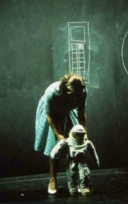 the far side of the moon tells the story of Philippe, a man who is coping with both the recent loss of his mother and the estrangement of his only sibling (his younger brother André). Philippe is a university student, who is presenting his Ph.D. thesis proposal for the third time after having it rejected twice before. The subject of Philippe's thesis is Konstantin Tsiolkovsky (1857-1935), a Soviet rocket pioneer who proposed building an elevator that would take humans into space so they could observe the Earth. This fanatical idea, which Philippe endorses (although he proposes building it on the far side of the moon so we wouldn't, or rather couldn't, look at the Earth) along with the Soviet-American "space race," the SETI program (Search for Extra-Terrestrial Intelligence), and memories from childhood and adolescence frame Philippe's journey, which seeks to answer the fundamental question, "Are we alone?" the far side of the moon tells the story of Philippe, a man who is coping with both the recent loss of his mother and the estrangement of his only sibling (his younger brother André). Philippe is a university student, who is presenting his Ph.D. thesis proposal for the third time after having it rejected twice before. The subject of Philippe's thesis is Konstantin Tsiolkovsky (1857-1935), a Soviet rocket pioneer who proposed building an elevator that would take humans into space so they could observe the Earth. This fanatical idea, which Philippe endorses (although he proposes building it on the far side of the moon so we wouldn't, or rather couldn't, look at the Earth) along with the Soviet-American "space race," the SETI program (Search for Extra-Terrestrial Intelligence), and memories from childhood and adolescence frame Philippe's journey, which seeks to answer the fundamental question, "Are we alone?"
Anderson's score is out of this world. It serves as the perfect compliment to the sense of lonliness and melocholy projected throughout the performance. Her textures range from middle-eastern sounding violin lines played above an ambient electronic drone, barren electronic landscapes, and desconstructed funk. The music during the plane sequence as Philippe flies to Moscow was particularly stirring. This is vintage Laurie Anderson--sublimely beautiful and moving. It gave me goosebumps. In addition to Anderson's score, there's also music by Led Zepplin, John Coltrane ("Naima"), and Beethoven (yes, the "Moonlight" sonata).
My only complaint is that UMS billed the show as a companion of sorts to The Elephant Vanishes: "If you loved last fall's production of The Elephant Vanishes, you won't want to miss the far side of the moon." I did love last fall's production of The Elephant Vanishes, except that it's very different from the far side of the moon. Elephant, which is based on three short stories by the Japanese author Haruki Murakami, is a technical and multimedia marvel. The opening sequence, meant to evoke the chaos and complexity of postmodern life in Tokyo, was simply breathtaking. I'd never seen anything quite like it and was almost in tears. Quite the contrary, far side doesn't have any of the high-tech wizardry that makes Elephant such eye candy--all the projected video is old archival footage of Russian cosmonauts and American astronauts; there are cheap puppets; and nobody tries to hide any of this. Yet the story is every bit as gripping and moving. But because of the advertising, it took me about 30 minutes to settle into far side's rhythm. Once I did settle in though, I was transported.
posted by Brian Sacawa
10:01 PM
Wednesday, March 09, 2005
Play ball!
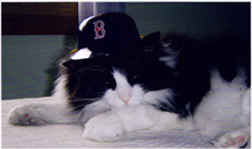 Baseball season is just around the corner and Kyle Gann's been making sports/music analogies. (That's Hotaru over there, by the way.) I like John Luther Adams' response, which likens music to baseball more than basketball. I've never been a big basketball fan--although I find the NCAA much more interesting than the NBA--and have often thought that a baseball game is like music. It is slow, like JLA says, but that only serves to increase the tension. It's like a late Feldman piece. Milton Babbitt, whose music is a bit more eventful than Feldman's, has a couple of baseball-inspired titles--Around the Horn (1993) for solo horn and Whirled Series (1987) for alto saxophone and piano. I'll be listening to Babbitt and Feldman for the next couple of weeks to get in the mood for opening day. Go Sox.
posted by Brian Sacawa
11:03 PM Baseball season is just around the corner and Kyle Gann's been making sports/music analogies. (That's Hotaru over there, by the way.) I like John Luther Adams' response, which likens music to baseball more than basketball. I've never been a big basketball fan--although I find the NCAA much more interesting than the NBA--and have often thought that a baseball game is like music. It is slow, like JLA says, but that only serves to increase the tension. It's like a late Feldman piece. Milton Babbitt, whose music is a bit more eventful than Feldman's, has a couple of baseball-inspired titles--Around the Horn (1993) for solo horn and Whirled Series (1987) for alto saxophone and piano. I'll be listening to Babbitt and Feldman for the next couple of weeks to get in the mood for opening day. Go Sox.
posted by Brian Sacawa
11:03 PM
It's all about the leos
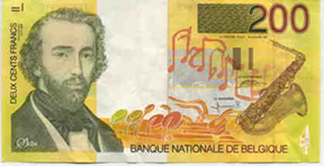
Although Belgium switched its currency from Francs to Euros in 2002, they really knew how to treat their cultural heroes. Proud of one of their own whose invention is known and performed around the world, they gave Adolphe Sax the distinction of gracing the 200 Belgian franc note. How about a Leo Fender $100 bill?
posted by Brian Sacawa
1:34 AM
Sunday, March 06, 2005
A live one
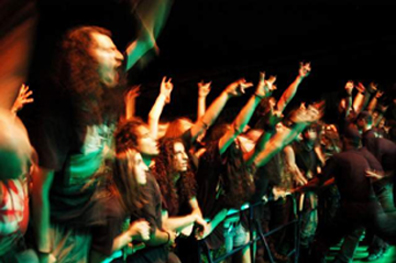
I noticed something from my last post. Six out of the ten solos I listed were recorded live. I don't think that's a coincidence. There's something about the energy, excitement, intensity, immediacy, and spontaneity of a live performance that simply cannot be captured in a controlled and sterile studio environment.
You don't hear live classical recordings that often. Occasionally you'll run into one--Lang Lang's "live" Carnegie Hall recital CD comes to mind. Although who knows just how much splicing and editing was done from the dress rehearsals. You don't see live classical albums nearly as often as live jazz or rock albums. Even Steely Dan, the rock and roll studio kings of the 1970s and 1980s, cut a live album not too long ago. (In fairness to Mr. Lang, there's a well-hidden but still audible edit in "Peg" on the Steely Dan album right before the final guitar solo--listen closely, you'll hear it.)
So why don't people make live classical albums? They're scared to, that's why. Who wants to take a chance at releasing an album with a wrong note (or two)? Imagine the humiliation and shame you'd feel in front of your peers, who never mess up. Today's advanced editing techniques have made it possible to create perfect, flawless, almost superhuman sounding recordings. You can even speed up a passage if you can't play it fast as you'd like to. Over time, the bar has been set continually higher for the polish and perfection of classical recordings. And that's not entirely bad. I think this high standard has spurred amazing advances in instrumental technique. But who can play flawlessly all the time? And what about the synergy between artist and audience?
Walter Benjamin talks about certain aspects of this phenomenon in his essay, "The Work of Art in the Mechanical Age of Reproduction." In one instance, he compares the stage actor's performance to that of a screen actor. The stage actor presents his/her artistic performance to the public in person. The screen actor's artistic performance is presented by the camera. And the camera that presents the performance to the public doesn't need to respect the performance as an integral whole. The editor chooses the sequence of events, camera angles, and close-ups, which then constitutes the completed film. One consequence of this is that the film actor lacks the opportunity to adjust to the audience that the stage actor does. This allows the audience to take the position of a critic without expreiencing any personal contact with the actor. Everybody's a critic.
While I've been up on my soapbox, I have to admit that my recordings contain editing. It's an accepted practice and everyone does it (sure sounds like peer pressure). In the end, it comes down to each artist's integrity. They've got to live with what they've chosen to do. Catholics might have a harder time with this than others. Someone could make an amazing sounding recording with a little (or a lot of) studio magic. However, if they've really pulled a fast one on everybody in the studio, the truth will inevitably come out in live performance. My next album won't be "clean" but one of these days I'll make a live album. Mark my words.
(Actually, not all of my recordings have editing. This one, which features me on alto saxophone with the Larry Teal Saxophone Quartet, was recorded live in concert.)
posted by Brian Sacawa
1:51 AM
|
|
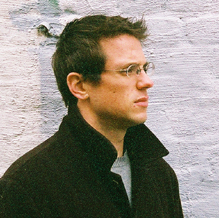 Praised by The New York Times as "an inventive musician . . . fresh and surprising," saxophonist Brian Sacawa has firmly established himself as an important contemporary voice for his instrument. He is active as a soloist, recitalist, and chamber musician throughout the United States and is the co-founder of the new music duo Non-Zero with percussionist Timothy Feeney.
Praised by The New York Times as "an inventive musician . . . fresh and surprising," saxophonist Brian Sacawa has firmly established himself as an important contemporary voice for his instrument. He is active as a soloist, recitalist, and chamber musician throughout the United States and is the co-founder of the new music duo Non-Zero with percussionist Timothy Feeney.
He has given premieres of over thirty works by both established and emerging composers, including Michael Gordon, Bright Sheng, Andrew Mead, Oliver Schneller, Ken Ueno, Beata Moon, Hillary Zipper, and Scott McAllister, among many others. Named the Baltimore CITYPAPER’s Critic’s Choice for Classical Music in 2002, he is the recipient of awards for solo performance from both national and international competitions.
Sacawa's versatile career has led to appearances with the St. Petersburg Philharmonic, the Detroit Symphony Orchestra, the New World Symphony, Harvard Group for New Music, New Music Brandeis, Bargemusic, and at meetings of the ISU Contemporary Music Festival, World Saxophone Congress, North American Saxophone Alliance, and New England Saxophone Symposium.
Brian holds degrees from the University of Michigan, the Peabody Conservatory, and the University of Massachusetts – Amherst, where he studied with Donald Sinta, Gary Louie, and Lynn Klock. He has recorded for the Equililbrium, Naxos, and BiBimBop recording labels.
See Brian's other blog
Sounds Like Now
| |



